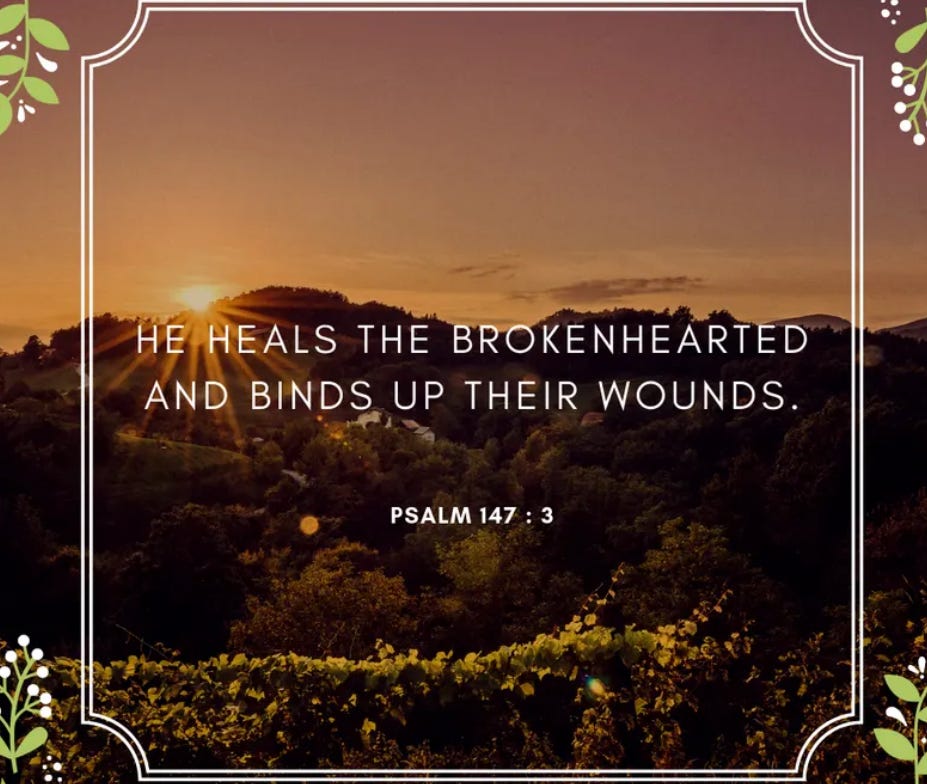We have all experienced a broken heart at some point in our lives. There are varying degrees of brokenness. Some are the breakup of our first childhood crush, while others are much deeper, more painful, and bring an inner trauma that cannot be seen with our natural eye. These wounds cannot be bound up and healed by a doctor as with stitches. These wounds require an inner healing by the Great Physician.
When I read Psalm 147:2-3 I immediately recognized the parable of the Good Samaritan that Jesus shared in Luke. They are one and the same. The word heals in Psalm 47 means to be cured, repair, to recover, to be thoroughly healed, made whole. Made whole from what? The broken-heart. What does a broken heart look like? It is one that has been smashed, crushed, shattered, destroyed. These are deep emotional and inner wounds. There are no physical bandages that can bind these wounds up.
The psalmist tells us that “He gathers the outcasts of Israel. He heals the brokenhearted and binds up their wounds.” Brokenhearted people tend to feel like an outcast many times. Remember the Samaritan women at the well? She most certainly considered herself an outcast which is why she made sure to come to the well when all the other women were not there. Shame will isolate you and keep you in a broken state…until the Healer comes to bind up those wounds.
To bind wounds means to twist, wrap around, and heal the pain, sorrow and grief of your broken heart. This is exactly what Jesus meant in the parable of the Good Samaritan. What prompted Jesus telling this parable? “A certain lawyer stood up and tempted Him, saying, Master, what should I do to inherit eternal life? The answer was correct by the law; to love the Lord thy God with all thy soul, with all they strength, and with all thy mind, and thy neighbor as thyself.” Then he tried to get technical; “who is my neighbor?”
Who is our neighbor? Jesus gives us the answer in this parable. A man traveling the Jericho road was badly beaten, robbed, stripped, and left for dead. I would imagine that not only were his physical wounds deep and painful; but his trauma was unseen, and was far more painful and in need of healing. There were two men that saw him and passed him by; a certain priest, and then a Levite. “And likewise a Levite, when he was at the place, came, and looked on him, and passed by on the other side.” Imagine seeing someone so badly beaten and in need of care, yet you not only walk on by, but you cross to the other side of the road and keep going!
Why did the Good Samaritan stop? “When he saw him, he had compassion on him, and went to him, and bound up his wounds, pouring in oil and wine…” Compassion is what stopped him in his tracks….he could not look away! This parable tells us a far deeper story than compassion. Yes, we are to have compassion on the broken hearted, however he went beyond binding his wounds. I find it very interesting that the word for wounds here in the Greek means trauma. He saw beyond the physical wounds, and immediately “pouring in oil and wine, and set him on his own beast and brought him to an inn and took care of him,”
Both the oil and the wine have medicinal healing properties in them. They cleanse and disinfect, and began the healing process. In the spiritual realm the oil and wine of the Holy Spirit is what brings healing and restoration to our broken hearts and inner trauma. As believers we are His hands and feet on this earth; we are to be the Good Samaritans to those who been beaten up and abused in various ways, and are suffering the trauma from it. He sends us out with the oil and wine of His Spirit to heal the brokenhearted and bind up their wounds. We cannot be the priest nor the Levite and walk past those who are in need of healing. There is more than one reason to keep oil in our lamps!
“He does not delight in the strength of the horse; He takes no pleasure in the legs of man. The LORD takes pleasure in those who fear Him, in those who hope in His mercy.” Psalm 147:10-11



